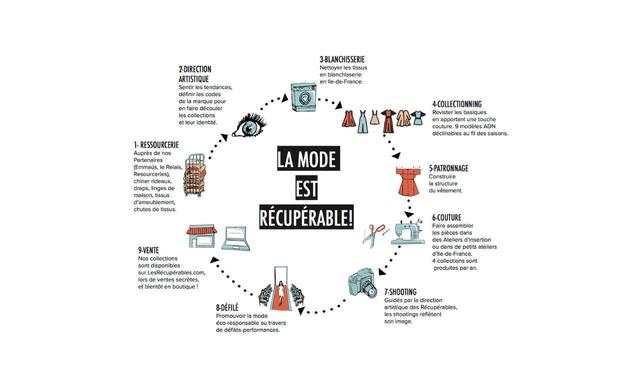Five eco-responsible brands for recycled and stylish clothing

By 2019, the government wants to "promote for the textile sector the main principles of the fight against food waste in order to ensure that unsold items are neither thrown away nor eliminated", announced Édouard Philip, April 23. Because fashion is the second most polluting industry after the oil sector. Each year, nearly 600,000 tonnes of clothing textiles, household linen and footwear (TLC) are put on the market (i.e. approximately 9.2 kilos per year and per inhabitant), according to the final report "I have fiber sorting” published by the organization Eco TLC. However, only a third of these resources were recycled in 2016. The rest went directly to waste status. So in this society where textiles like the rest have gone into “fast” mode, five French brands stand out. Focus on these companies that revive the fabric.
Upcycling or the art of bringing fabrics back to life
“The action of recovering unused materials or materials and transforming them into superior quality materials or materials”, here is the definition given by Anaïs Dautais Warmel, creator of Les Récupérables, to what is called upcycling. Since 2015, this brand, based entirely on this principle, has been offering quality clothing resulting from a work of "textile revaluation". Sheets, curtains, tablecloths, duvet covers, furnishing fabrics… “Second-hand” textiles are collected in recycling centers or relays with the aim of bringing them back to life. Because “why produce more when there are so many materials to reuse on our planet?” wonders the founder "bathed since childhood in recycling".
The challenge of this process therefore lies in the fact of creating collections in tune with the times. And it's rather successful on the side of Les Récupérables with nine models available in floral fabrics with modern cuts. “Krop-top”, “Kombi”, “Eskale” dress or even “kiplisse” skirt… “Fashion is a case (K, editor’s note) to be treated urgently”, for the founder but … “without making any concession to pace!
From resource to sale
Bet also won for Atelier Gaëlle Constantini. The artistic director uses upcycling and designs her clothes in geometric shapes and in sober colors. The goal: to suit all women of all shapes. Another French label stands out in this recycling industry. Floriane Fosso, creator of the eponymous brand, collects fabric scraps from major fashion houses to create her collections. Even luxury can rhyme with upcycling.

W.Y.L.D.E., created by Clarissa Acario in 2013, is also part of the circular economy. By choosing "vintage" clothes, in "quality" materials, which she constructs and deconstructs according to her desires, Clarissa Acario has built a high-end brand image and offers clothes that do not resemble any piece from fast fashion. "Impossible to look like her office colleague with this ethical and unique fashion," says the artistic director from Brazil, where she "naturally" acquired this taste for recycling. “There, we learn from a very young age to make new things with scraps of fabric. And to recycle. Because, yes, Wylde has two hats: that of upcycling and that of recycling. And it's not really the same thing.
Recycling or the art of transforming matter
Finding suppliers of recycled fibers and made in France, here is the challenge of the Wylde collections made up of unique pieces in basic materials to wear all the year. From the chosen material (denim or poplin) to the buttons and labels, everything is recycled except for the zippers used on a small number of pieces. But the brand is not alone in this field.
Hopaal, already well established in the 100% recycled market, offers basics. Sweaters, sweatshirts, t-shirts, socks... "No material has been and will be drawn from the planet's reserves to make our clothes", states the brand on its site. Clothing made from recycled fibers comes from harvesting organic cotton scraps and used plastic bottles. These two materials are then crushed in order to be brought back to the state of fibers – cotton for one and polyester for the other. A new yarn is then formed and used to make the clothes. According to Clarissa Acario, “recycled materials have 98% less impact on the planet since they require less water and energy”. Evidenced by this diagram visible on the site of Hopaal.
The advantages of a recycled t-shirt
Fast-fashion on a responsible path?
Beyond these committed brands, some fast-fashion brands have fortunately decided to take a first step towards recycling. When some produce one or more collections in recycled fibers, others participate in their own way by organizing used clothing collections. Uniqlo, H&M, Mango, Camaieu… The latest, Cyrillus, engaged since 2016 in the occasional collection of clothing from all brands, has launched since March 2018 a permanent collection with the aim of creating collections in recycled fibers.
In exchange, most of these stores offer vouchers to encourage people to drop off their old clothes instead of throwing them away. "It's important to manage the end of life of clothes," says Clarissa Acario. So whether you entrust them to your favorite brand or turn to recycling centers, relay points or Emmaüs, one watchword: no longer abandon them in your trash.
On video: textile workers dance against fast fashion
Five responsible brands for stylish, recycled clothing
The editorial staff advises you
- Prev
- Next







